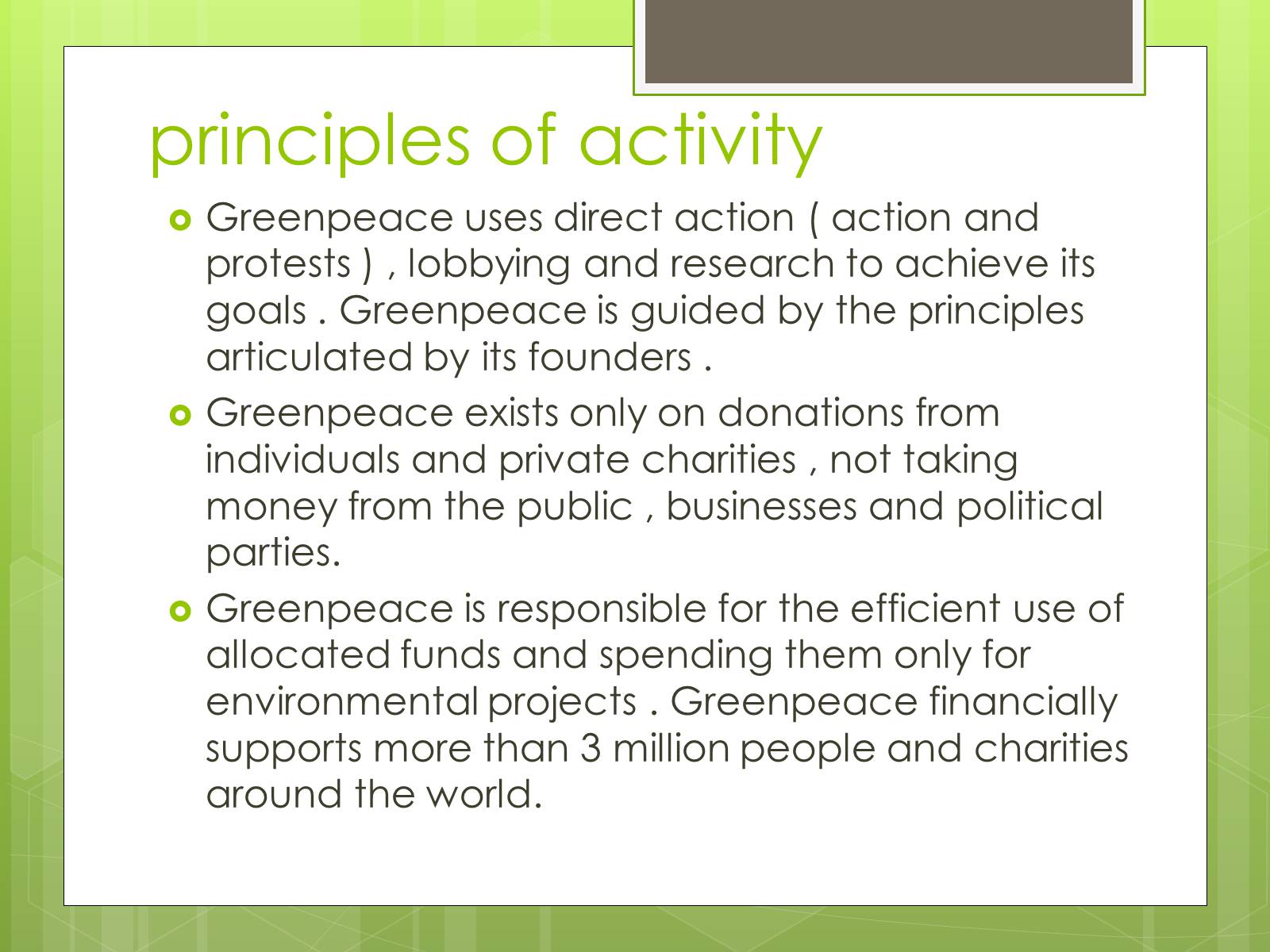- Головна
- Готові шкільні презентації
- Презентація на тему «Greenpeace» (варіант 3)
Презентація на тему «Greenpeace» (варіант 3)
363
Слайд #1
Greenpeace

Слайд #2
Greenpeace - international independent non-governmental environmental organization, which consists of Greenpeace International (GPI), headquartered in Amsterdam and 30 regional offices in 47 countries.
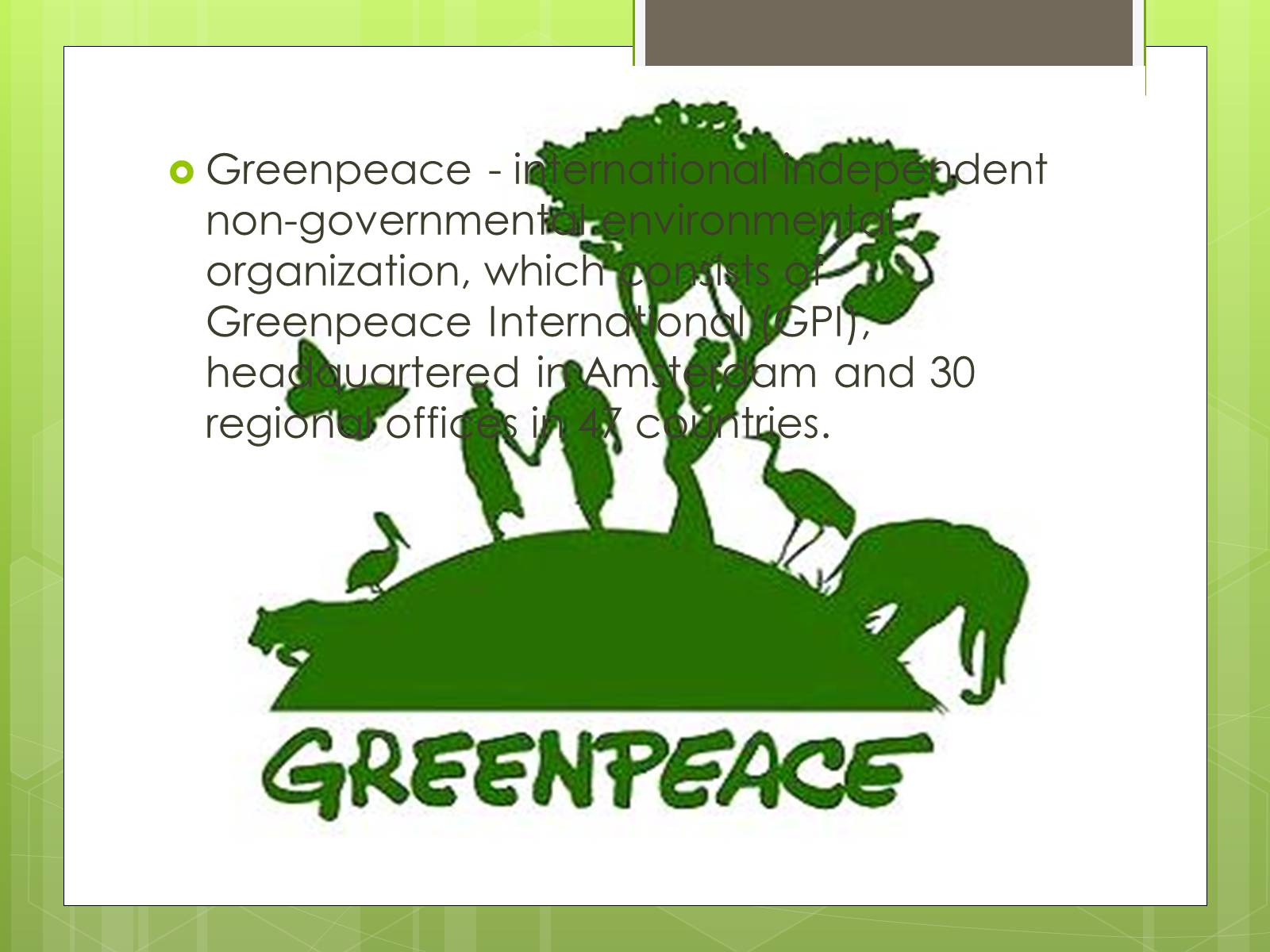
Слайд #3
Current director of GPI –
Kumi Naidoo –South AfricanPublic figure and a fighter against apartheid.
Kumi Naidoo –South AfricanPublic figure and a fighter against apartheid.
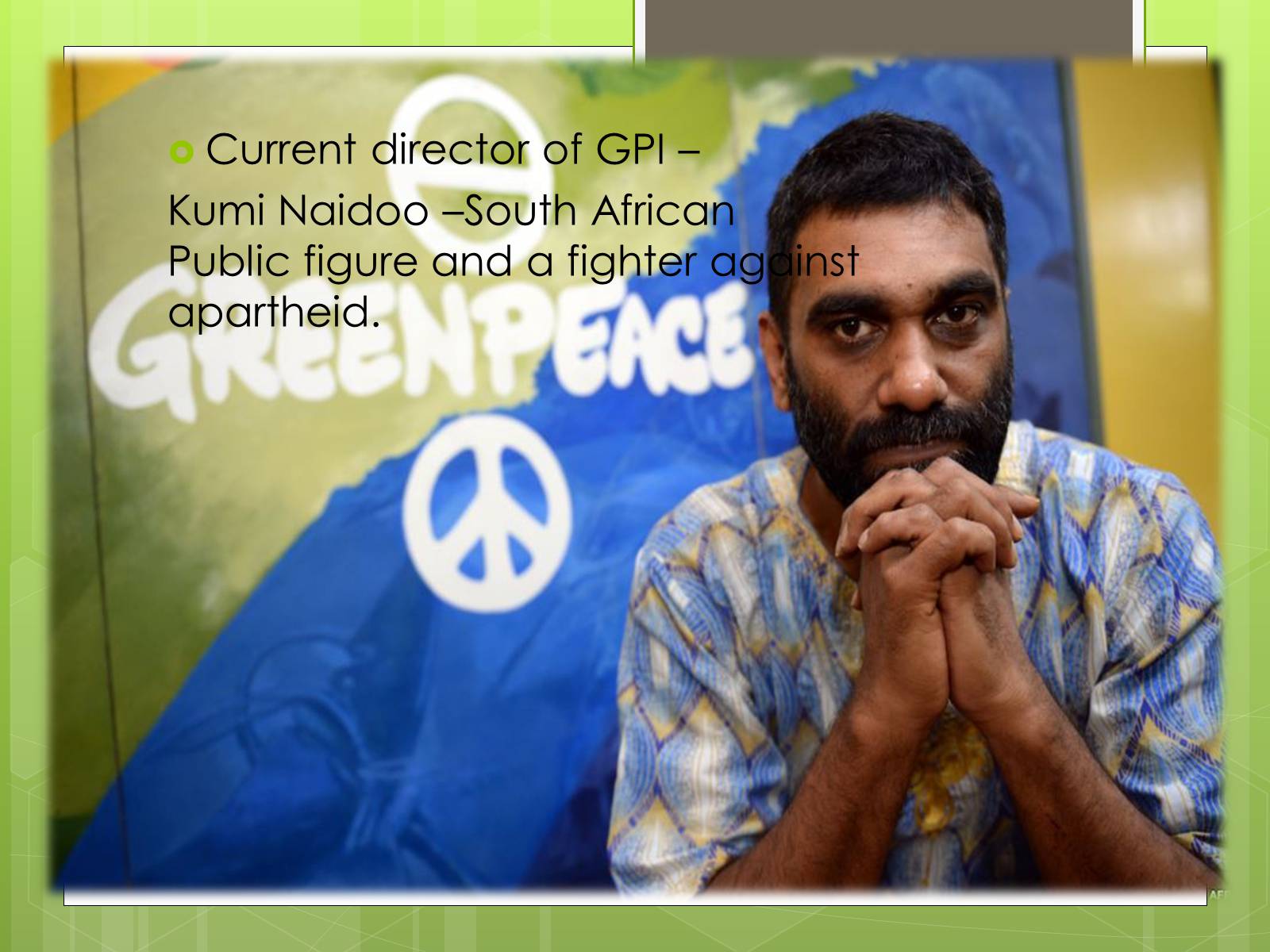
Слайд #4
Organisational structure
Regional offices work largely autonomously under the guidance of GPI. Greenpeace has a staff of more than 2,500 employees and 14,500 volunteers around the world (Annual report 2012).
The main governing body is the Board of Greenpeace, consisting of representatives of all regional offices.
Regional offices work largely autonomously under the guidance of GPI. Greenpeace has a staff of more than 2,500 employees and 14,500 volunteers around the world (Annual report 2012).
The main governing body is the Board of Greenpeace, consisting of representatives of all regional offices.
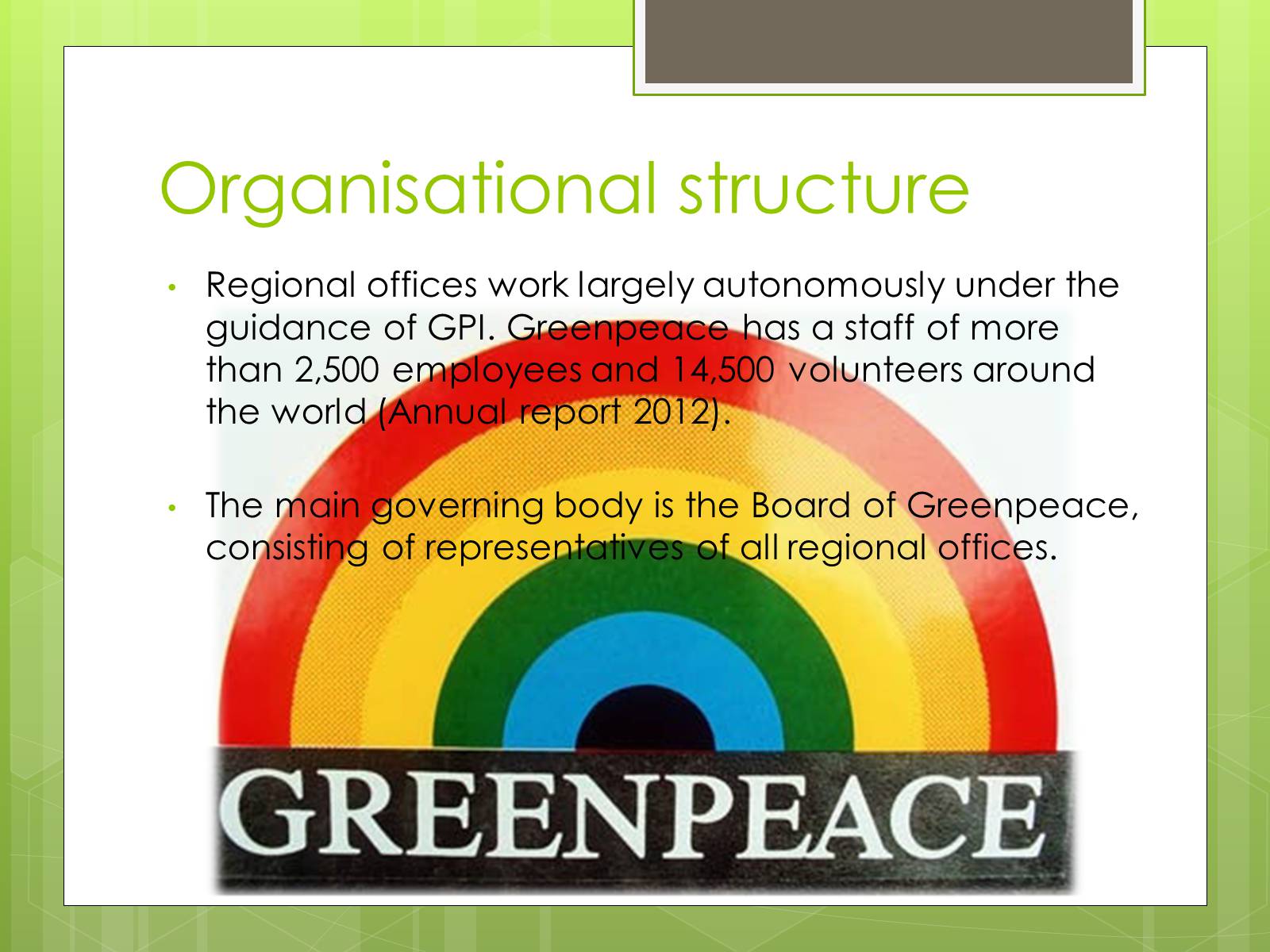
Слайд #5
mission
The objectives of Greenpeace - environmental protection, environmental education and promotion of eco-friendly lifestyle.
In the view of the organization are global environmental problems such as global climate change, loss of tropical and boreal forests, excessive commercial fishing, commercial whaling, the development of genetic engineering, radiation hazards and a new line of work - preserving Arctic.
The objectives of Greenpeace - environmental protection, environmental education and promotion of eco-friendly lifestyle.
In the view of the organization are global environmental problems such as global climate change, loss of tropical and boreal forests, excessive commercial fishing, commercial whaling, the development of genetic engineering, radiation hazards and a new line of work - preserving Arctic.
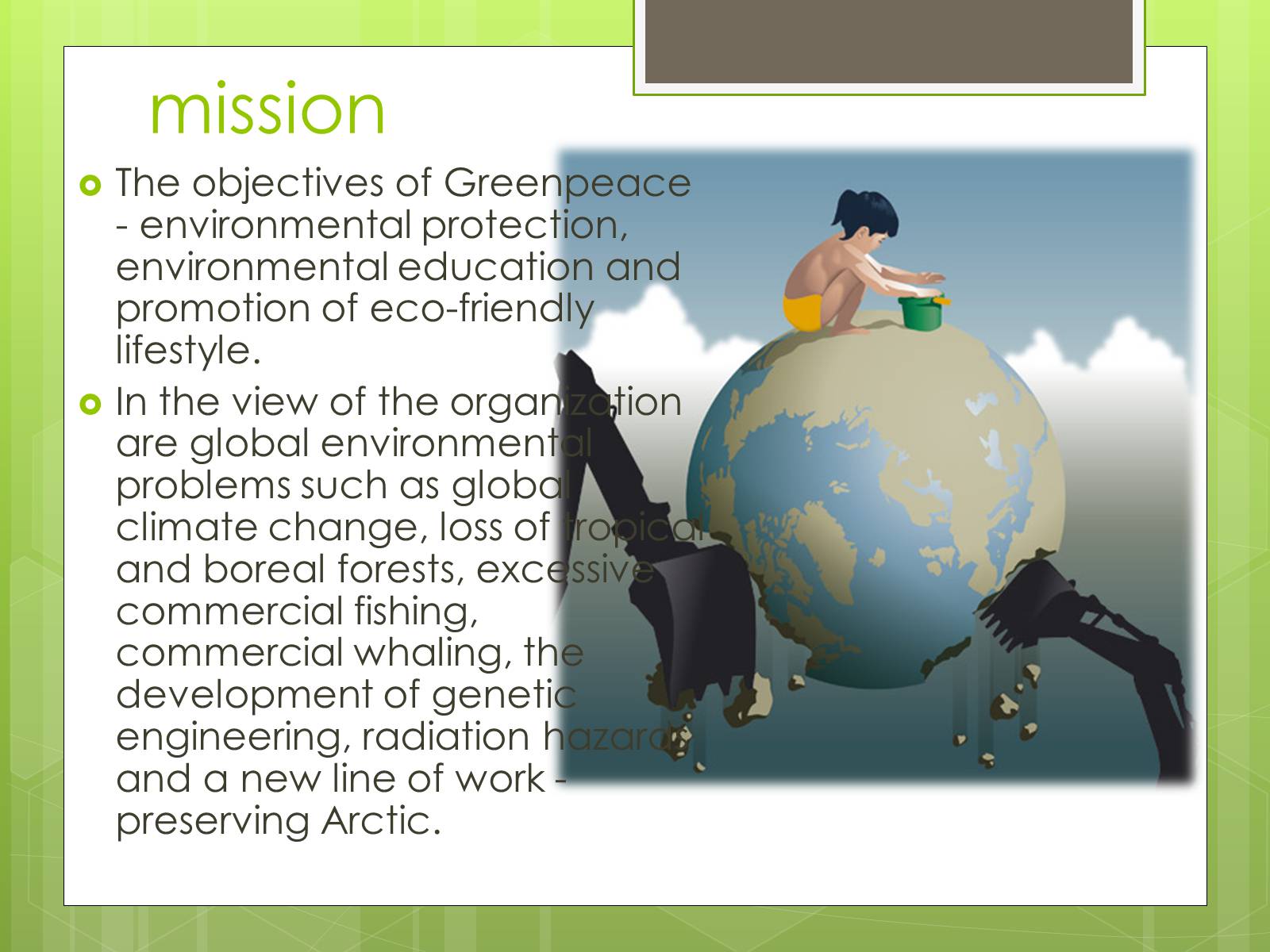
Слайд #6
structure
Regional offices combine several states:
Central and Eastern Europe (Austria, Hungary, Poland, Slovakia, Slovenia)
Scandinavia (Denmark, Finland, Norway, Sweden)
Mediterranean (Israel, Lebanon, Malta, Turkey)
Southeast Asia (Indonesia, Thailand, Philippines)
Australia and Oceania (Australia, Papua - New Guinea, Solomon Islands, Fiji)
Regional offices combine several states:
Central and Eastern Europe (Austria, Hungary, Poland, Slovakia, Slovenia)
Scandinavia (Denmark, Finland, Norway, Sweden)
Mediterranean (Israel, Lebanon, Malta, Turkey)
Southeast Asia (Indonesia, Thailand, Philippines)
Australia and Oceania (Australia, Papua - New Guinea, Solomon Islands, Fiji)
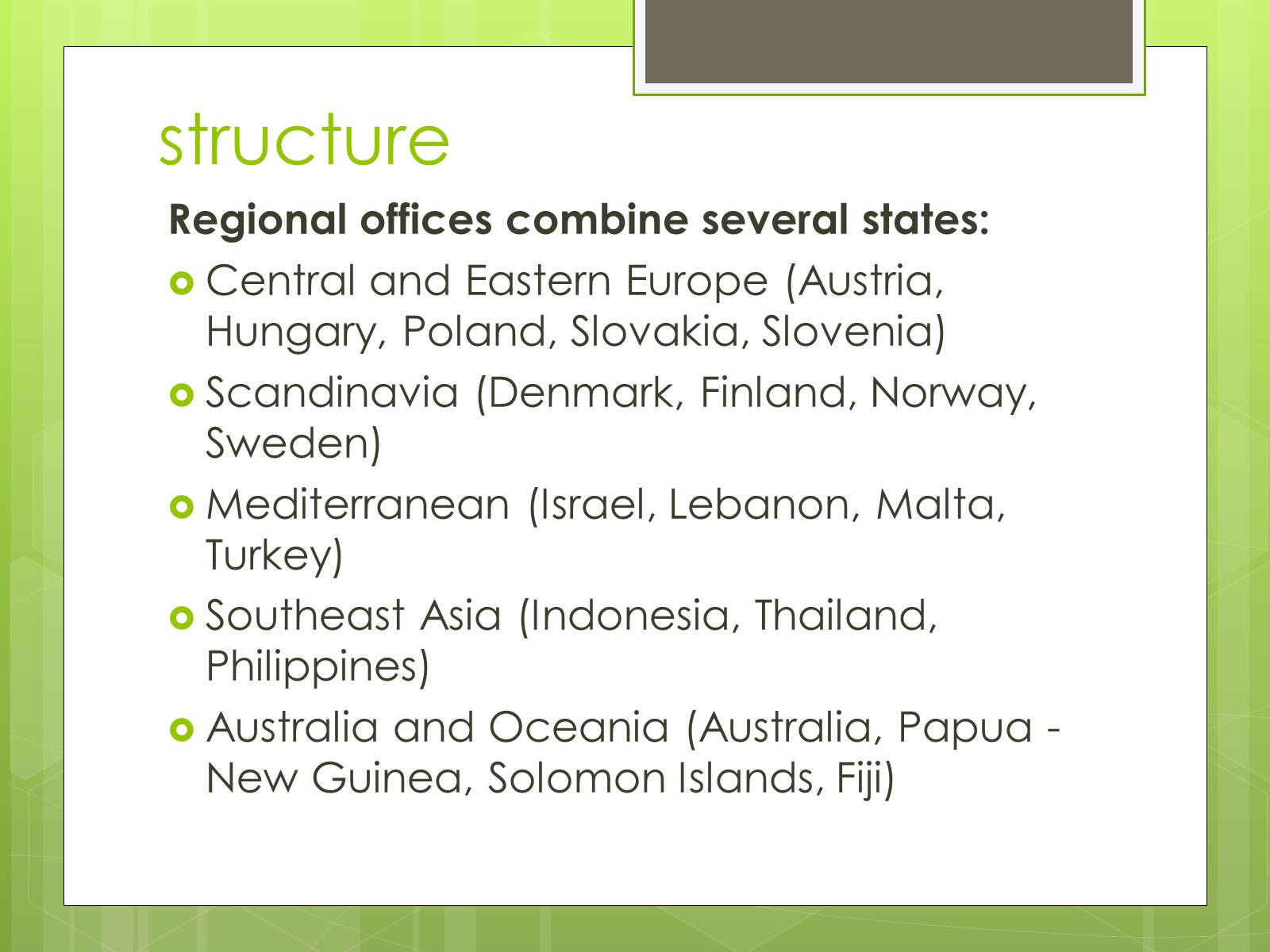
Слайд #7
national offices
Europe: Belgium, United Kingdom, Germany, Greece, Ireland, Italy, Luxembourg, Netherlands, Portugal, Romania, Russia, France, Czech Republic, Switzerland
Asia: India, China, Japan
Africa: Congo, Senegal, South Africa
North America: Canada, Mexico, United States
South America: Argentina, Brazil, Chile
Australia and Oceania: New Zealand
Europe: Belgium, United Kingdom, Germany, Greece, Ireland, Italy, Luxembourg, Netherlands, Portugal, Romania, Russia, France, Czech Republic, Switzerland
Asia: India, China, Japan
Africa: Congo, Senegal, South Africa
North America: Canada, Mexico, United States
South America: Argentina, Brazil, Chile
Australia and Oceania: New Zealand
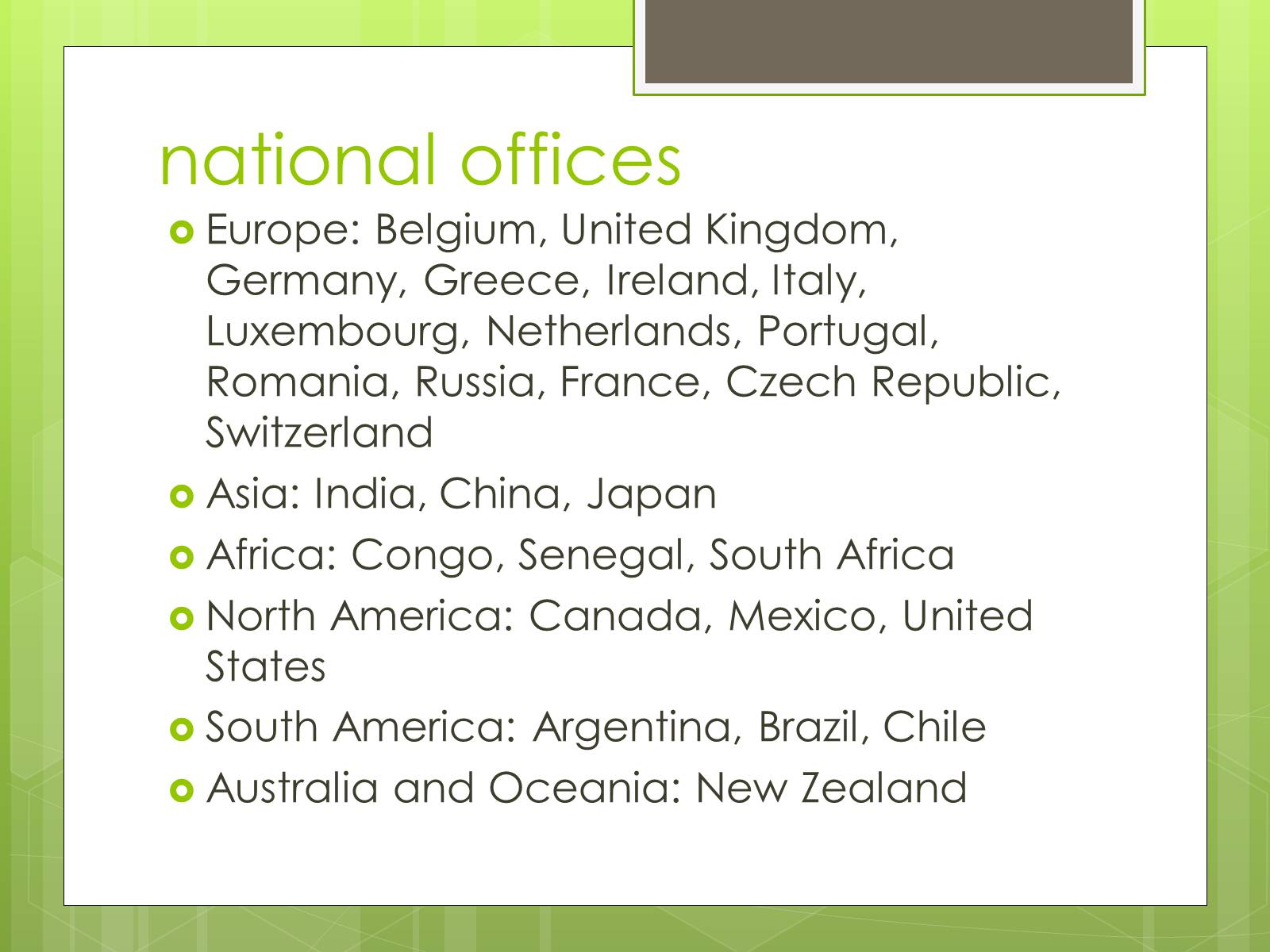
Слайд #8
"Protecting the Arctic"
In July 2012 , Greenpeace began to share «Save The Arctic» - « Protect the Arctic" , which aims to create a global reserve around the North Pole - a comprehensive ban of oil production, commercial fishing and wars in the region.
Greenpeace demands the creation of the world reserve shall be distributed to the entire territory of the Arctic, but only on the high-latitude region around the North Pole , a territory which does not belong to anyone now .
Less than a month after the start of the action has been collected over a million signatures by the end of September 2012 the number of signatures was about 2 million
In July 2012 , Greenpeace began to share «Save The Arctic» - « Protect the Arctic" , which aims to create a global reserve around the North Pole - a comprehensive ban of oil production, commercial fishing and wars in the region.
Greenpeace demands the creation of the world reserve shall be distributed to the entire territory of the Arctic, but only on the high-latitude region around the North Pole , a territory which does not belong to anyone now .
Less than a month after the start of the action has been collected over a million signatures by the end of September 2012 the number of signatures was about 2 million
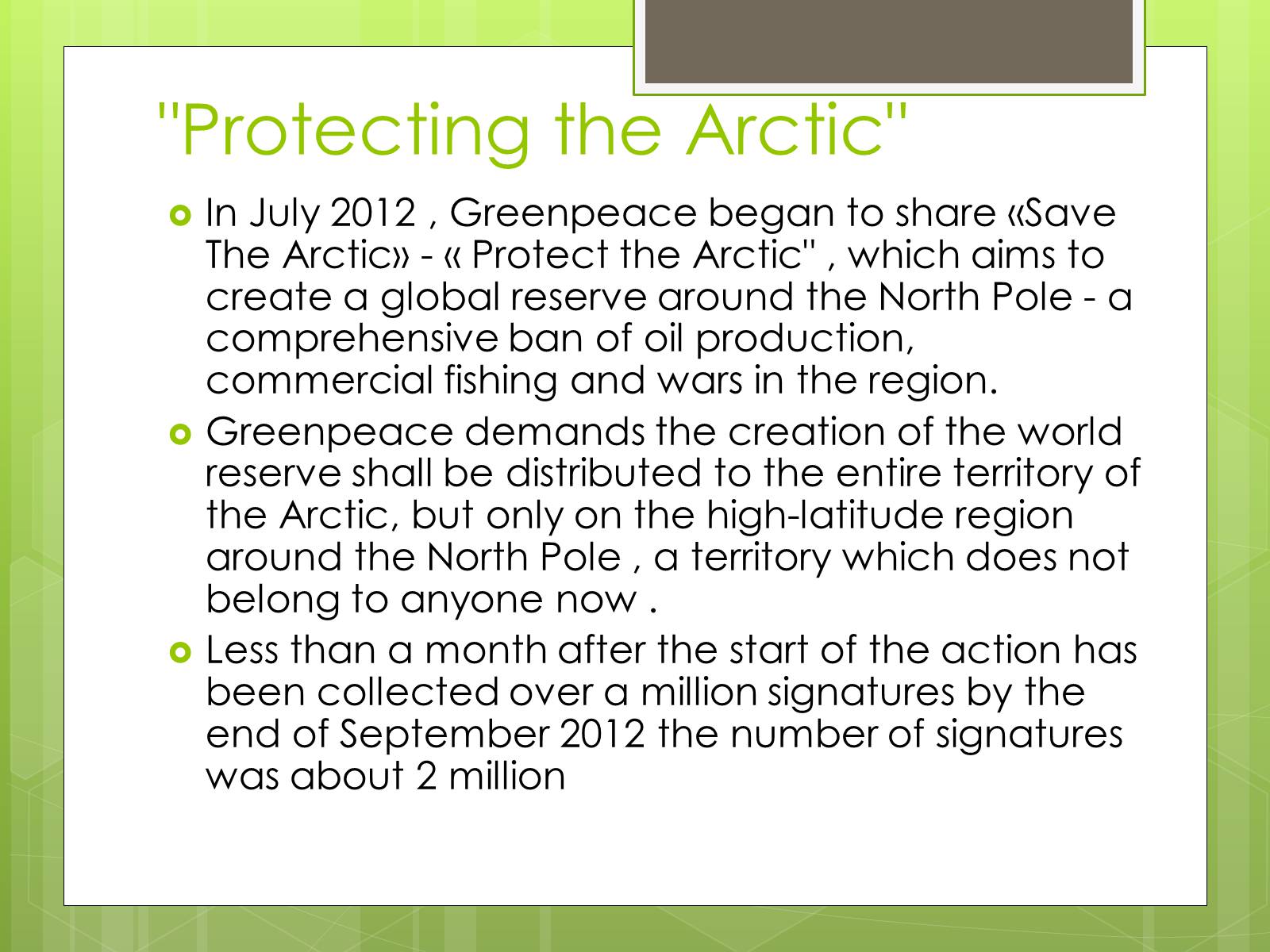
Слайд #9
"Protecting the Arctic"
In July 2012 , Greenpeace began to share «Save The Arctic» - « Protect the Arctic" , which aims to create a global reserve around the North Pole - a comprehensive ban of oil production, commercial fishing and wars in the region.
Greenpeace demands the creation of the world reserve shall be distributed to the entire territory of the Arctic, but only on the high-latitude region around the North Pole , a territory which does not belong to anyone now .
Less than a month after the start of the action has been collected over a million signatures by the end of September 2012 the number of signatures was about 2 million
In July 2012 , Greenpeace began to share «Save The Arctic» - « Protect the Arctic" , which aims to create a global reserve around the North Pole - a comprehensive ban of oil production, commercial fishing and wars in the region.
Greenpeace demands the creation of the world reserve shall be distributed to the entire territory of the Arctic, but only on the high-latitude region around the North Pole , a territory which does not belong to anyone now .
Less than a month after the start of the action has been collected over a million signatures by the end of September 2012 the number of signatures was about 2 million
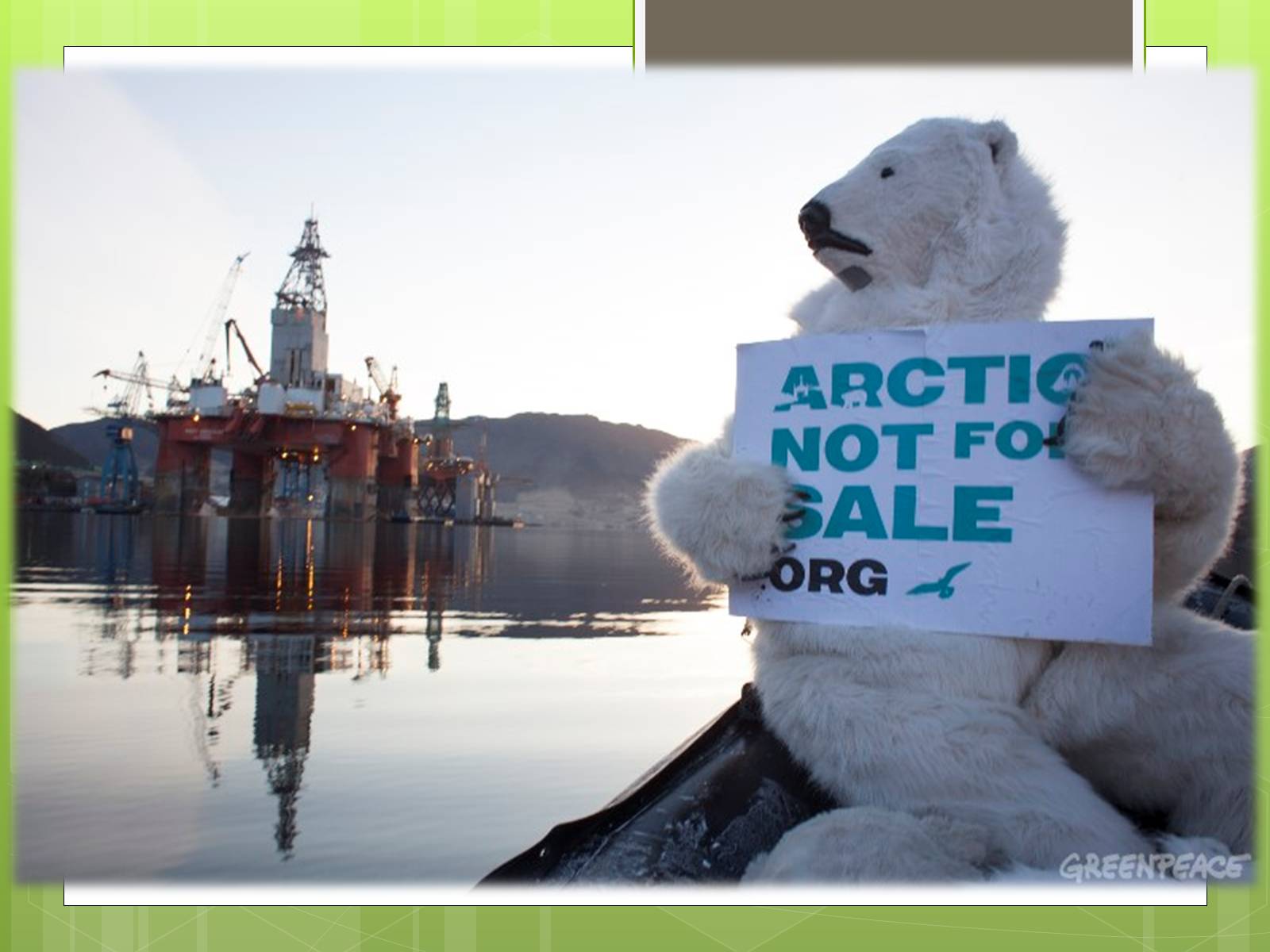
Слайд #10
principles of activity
Greenpeace uses direct action ( action and protests ) , lobbying and research to achieve its goals . Greenpeace is guided by the principles articulated by its founders .
Greenpeace exists only on donations from individuals and private charities , not taking money from the public , businesses and political parties.
Greenpeace is responsible for the efficient use of allocated funds and spending them only for environmental projects . Greenpeace financially supports more than 3 million people and charities around the world.
Greenpeace uses direct action ( action and protests ) , lobbying and research to achieve its goals . Greenpeace is guided by the principles articulated by its founders .
Greenpeace exists only on donations from individuals and private charities , not taking money from the public , businesses and political parties.
Greenpeace is responsible for the efficient use of allocated funds and spending them only for environmental projects . Greenpeace financially supports more than 3 million people and charities around the world.
